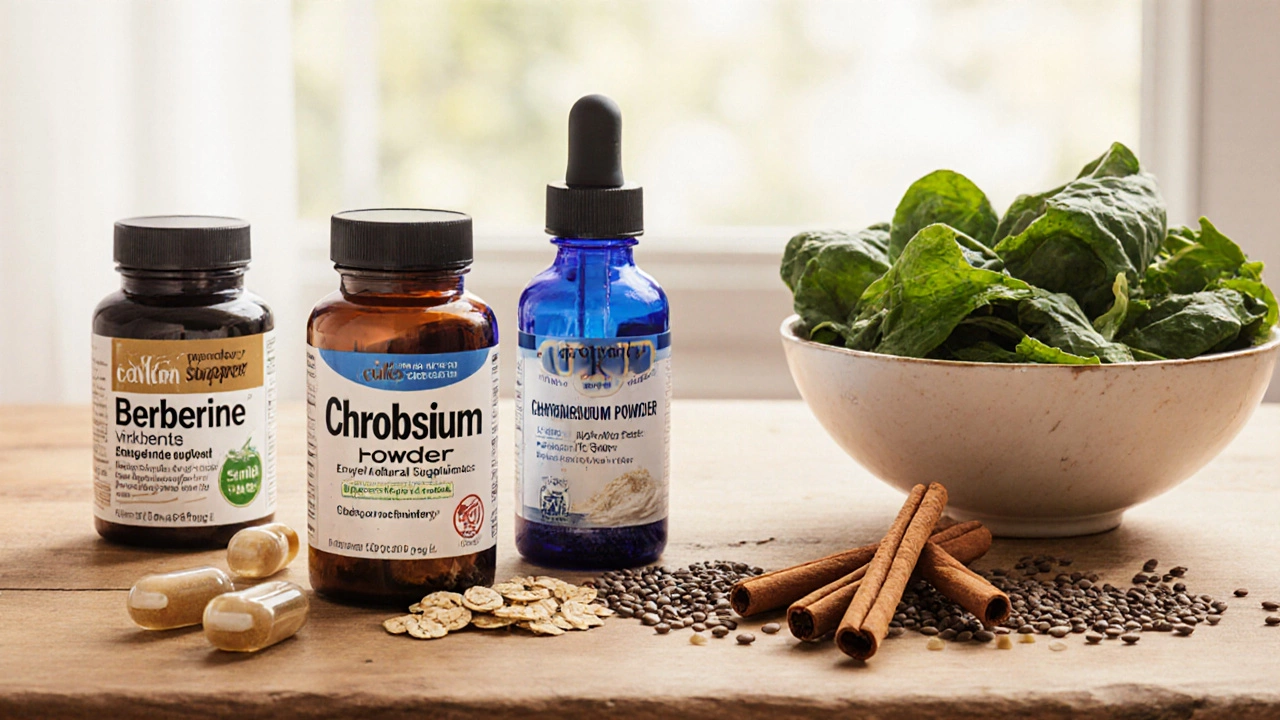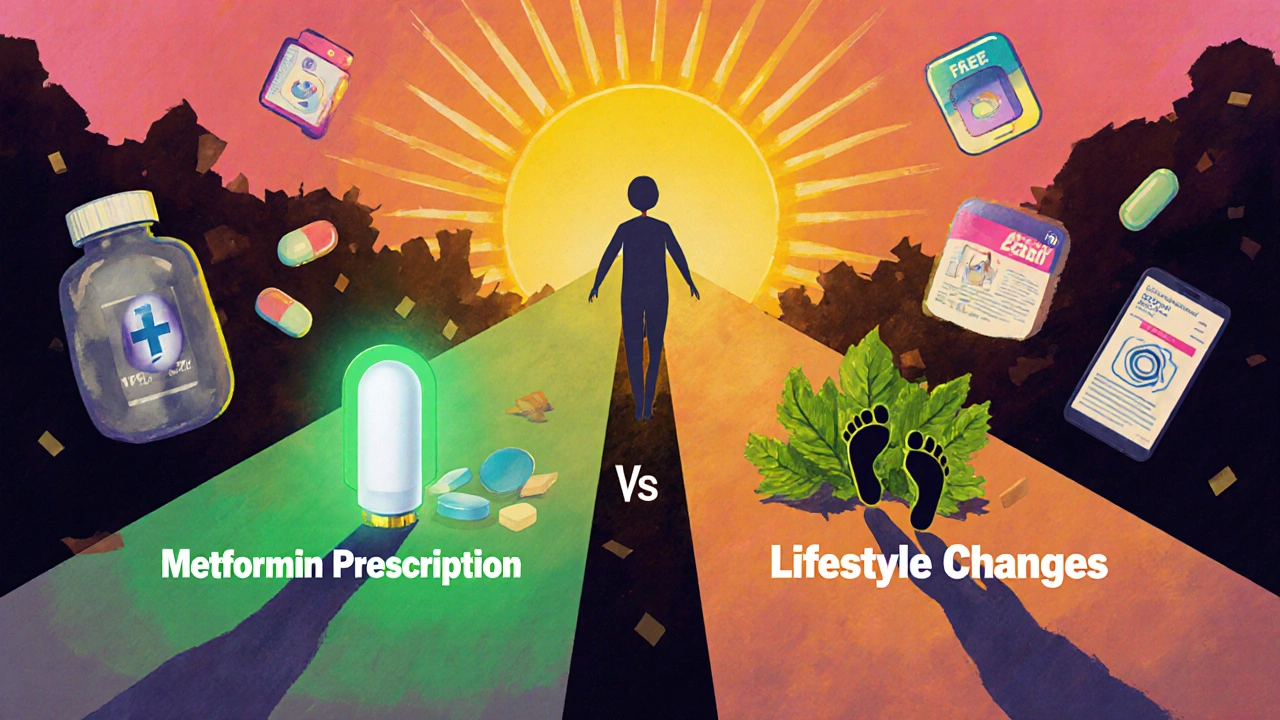Blood Sugar Reduction Estimator
How this tool works
Based on clinical studies cited in the article, this calculator estimates how much your blood sugar could drop with specific lifestyle changes and supplements. No OTC product fully replaces metformin, but these strategies can help improve insulin sensitivity and reduce blood sugar naturally.
Important: This tool provides estimates based on published research. It's not medical advice. Always consult your doctor before changing diabetes management.
There’s no over the counter pill that works exactly like metformin. That’s not just a legal restriction-it’s science. Metformin is a prescription drug with a specific mechanism: it lowers liver glucose production, improves insulin sensitivity, and reduces intestinal sugar absorption. No OTC supplement does all three. But people with prediabetes or early type 2 diabetes often look for alternatives because of side effects, cost, or access issues. So what actually helps? And what’s just marketing?
There’s no true OTC metformin replacement
Metformin isn’t available over the counter in the U.S., India, or most countries because it’s a potent drug with real risks. Taking it without medical supervision can cause lactic acidosis, especially in people with kidney problems. OTC products can’t legally claim to replicate its effects. Any product saying it’s "the natural metformin" is misleading. The FDA and Indian drug regulators don’t approve supplements to replace prescription diabetes meds.
But that doesn’t mean nothing helps. The real goal isn’t to find a pill that acts like metformin-it’s to lower blood sugar safely, improve insulin response, and prevent progression. And that’s where lifestyle and science-backed supplements come in.
What actually lowers blood sugar naturally?
Four things have strong evidence: exercise, weight loss, fiber, and specific supplements. No single supplement replaces metformin, but together they can make a difference.
Exercise is the most powerful insulin sensitizer you have. Just 30 minutes of brisk walking after meals drops blood sugar by 20-30 mg/dL in many people. It’s not magic-it’s muscle. When muscles contract, they pull glucose from the blood without needing insulin. Do this daily, and you’re doing what metformin tries to do, but better.
Weight loss-even 5-7% of body weight-can reverse prediabetes in up to 60% of cases, according to the Diabetes Prevention Program study. That’s more effective than metformin alone. Fat around the liver and belly makes cells resistant to insulin. Lose that fat, and your body starts responding again.
Fiber slows sugar absorption. Aim for 30-40 grams a day. Oats, lentils, chia seeds, and vegetables do this well. A 2023 meta-analysis in BMJ Nutrition found that high-fiber diets reduced HbA1c by 0.5-0.8% on average-similar to the effect of low-dose metformin.
Supplements with real data behind them
These aren’t "miracle cures," but they’ve been studied in humans with type 2 diabetes or prediabetes. Use them as support, not replacement.
- Berberine: This yellow compound from plants like goldenseal and barberry has been compared to metformin in multiple trials. A 2020 study in Metabolism found that 500 mg of berberine taken three times daily lowered HbA1c by 1.0% over 12 weeks-same as metformin. It works by activating AMPK, the same energy sensor metformin targets. Side effects? Mild stomach upset, like metformin. It’s available in India under brands like Berbaprime or Ayurvedic formulations.
- Chromium picolinate: Chromium helps insulin bind to cells. A 2022 review in Journal of Clinical Pharmacy and Therapeutics showed that 200-1000 mcg daily improved fasting glucose by 15-20 mg/dL in prediabetics. Best for people with low chromium levels, common in processed-food diets.
- Magnesium: Nearly 50% of people with type 2 diabetes are deficient. Magnesium helps insulin move glucose into cells. A 2021 trial showed 300 mg daily reduced fasting glucose and HbA1c. Found in spinach, almonds, pumpkin seeds, and supplements.
- Cinnamon (Ceylon type): Not the cheap cassia variety. Ceylon cinnamon has lower coumarin, which can harm the liver. Studies show 1-3 grams daily lowers fasting glucose by 10-15%. It’s not strong, but it’s safe and easy to add to tea or oatmeal.
What doesn’t work? Bitter melon extract, fenugreek, and amla (Indian gooseberry) have traditional use, but human trials are weak or inconsistent. They might help a little, but don’t count on them.

What to avoid
Some OTC products make bold claims but are dangerous or useless.
- "Diabetes cure" pills sold online: These often contain hidden metformin or glipizide-prescription drugs not labeled. In 2024, India’s drug regulator seized over 12,000 such fake products. Taking unregulated metformin without monitoring can be life-threatening.
- Apple cider vinegar pills: The liquid form may help a bit (5-10% drop in post-meal sugar), but pills don’t deliver enough acid. Stick to 1-2 tablespoons diluted in water before meals if you want to try it.
- High-dose vitamin D: Only helps if you’re deficient. Most people aren’t. Taking 5000 IU daily won’t fix insulin resistance if your levels are normal.
How to use supplements safely
If you’re considering berberine or chromium:
- Get your HbA1c and kidney function tested first. Berberine can affect liver enzymes.
- Start low: 500 mg berberine once a day, not three times. See how your body reacts.
- Take it with food to reduce stomach upset.
- Don’t mix with other diabetes meds unless your doctor says so. Combining berberine with metformin can over-lower blood sugar.
- Check labels. In India, look for FSSAI-certified brands. Avoid products with "secret formulas" or no ingredient lists.
Track your blood sugar with a glucometer. Check fasting levels and 2 hours after meals. If your numbers drop below 70 mg/dL, stop the supplement and eat something.

When to see a doctor
If your fasting blood sugar is above 126 mg/dL or HbA1c is above 6.5%, you have diabetes. Lifestyle and supplements can help, but you need medical care. Metformin is still the safest, cheapest, and most proven first-line treatment. Skipping it because you want an "natural" option can lead to nerve damage, vision loss, or kidney problems.
Many doctors in India now support combining metformin with berberine or magnesium for better control. But only if they know you’re taking it. Don’t hide supplements from your doctor. They can adjust your dose to avoid lows.
Bottom line: No magic pill, but real progress is possible
You can’t replace metformin with an OTC supplement. But you can reduce your reliance on it-or even avoid it-by changing how you eat, move, and sleep. Berberine is the closest thing to a natural mimic, but it’s not better. It’s different. It works through the same pathway, but slower.
Real success comes from consistency: walking after dinner, eating lentils and greens, sleeping 7 hours, and checking your sugar. That’s the real "prescription." Supplements? They’re sidekicks. Not the hero.
If you’re thinking of stopping metformin, talk to your doctor first. Don’t switch to a bottle from a street vendor or an Instagram ad. Your health isn’t a trend.
Can I buy metformin over the counter in India?
No, metformin is a prescription-only medicine in India. It’s classified as a Schedule H drug, meaning it can’t be sold without a doctor’s prescription. Pharmacies that sell it without a script are breaking the law. Some people buy it online or from street vendors, but that’s risky-many of these products are fake or contain unsafe doses.
Is berberine safer than metformin?
Berberine has similar side effects to metformin-mainly stomach upset, bloating, and loose stools. It’s not inherently safer. People with liver or kidney disease should use it cautiously. Unlike metformin, berberine isn’t studied for long-term safety in large populations. Metformin has over 60 years of use and millions of users worldwide. Berberine is promising but still considered an experimental supplement in most medical guidelines.
How long does it take for berberine to lower blood sugar?
Most people see a drop in fasting blood sugar within 2-4 weeks. HbA1c changes take longer-usually 8-12 weeks. A 2020 study showed HbA1c dropped by 1% after 12 weeks of taking 500 mg three times daily. Results vary based on diet, activity, and how advanced the diabetes is.
Can I take chromium and magnesium together?
Yes. Chromium and magnesium work on different parts of insulin signaling and are often low in people with insulin resistance. Taking them together is safe and may have a combined effect. Typical doses: 200-500 mcg of chromium picolinate and 200-400 mg of magnesium glycinate or citrate daily. Take with food to avoid stomach upset.
Do herbal teas like bitter melon or fenugreek help with blood sugar?
They might help a little, but not reliably. Bitter melon juice can cause low blood sugar in some people, especially if taken with other meds. Fenugreek seeds can lower sugar, but studies are small and inconsistent. Neither is strong enough to replace medication. If you drink them, monitor your sugar closely. Don’t rely on them as your main treatment.
Next steps if you’re trying to reduce metformin
Start here:
- Get your HbA1c and fasting glucose tested if you haven’t in the last 3 months.
- Walk 10 minutes after every meal. Set a phone reminder if you need to.
- Replace white rice and bread with brown rice, millet, or quinoa.
- Try 500 mg berberine once daily with dinner for 4 weeks. Track your sugar before and after.
- Call your doctor. Say: "I’m trying to manage my sugar better. Can we talk about adding supplements or adjusting my dose?"
Progress isn’t about finding the perfect pill. It’s about building habits that make your body work better. That’s how people reverse prediabetes. That’s how they live without meds. And yes-it’s harder than popping a tablet. But it lasts longer.
